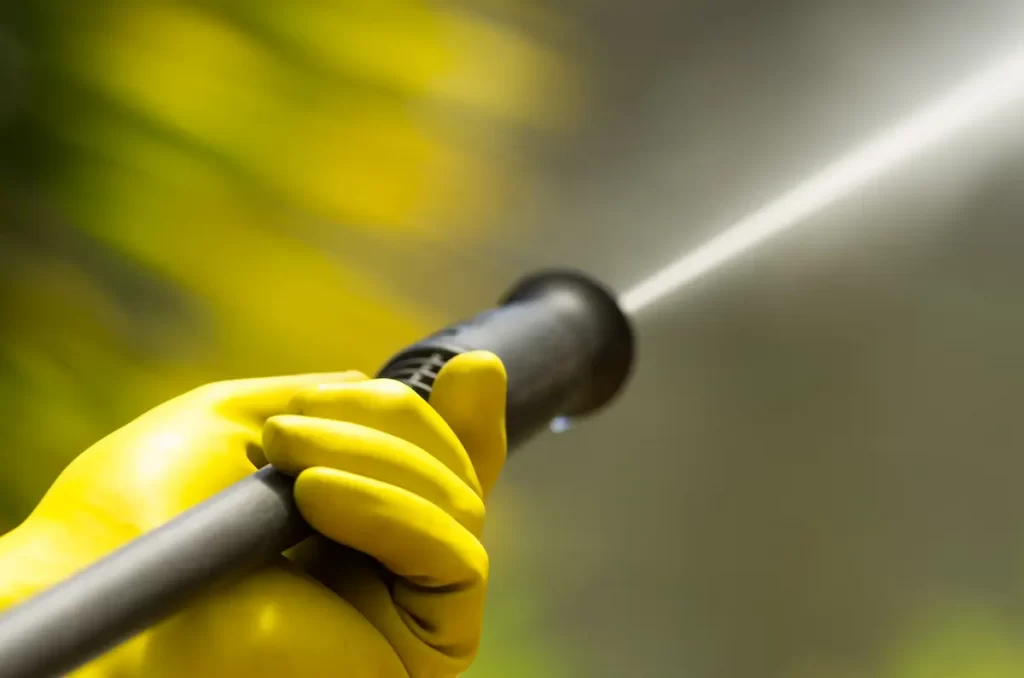The average pressure washer spray, at full power, is 20 feet. Homeowner pressure washers will produce 1,000 to 4,000 PSI. Long-distance pressure washers with industrial strength can produce 6,000 PSI and blast water 40 to 60 feet away.
When looking for an effective pressure washer, it’s important to consider the necessary spray force for cleaning various surfaces.
For any surface or object, we have the appropriate pressure washer spray.
We need to ensure that the pressure washer we choose can effectively clean surfaces of varying heights and widths. How far can a pressure washer typically spray?
If you’re looking to buy a pressure washer, you’ll find that they come in two types: gas or electric. They also have various nozzle tips, PSI strengths, and hose lengths.
With all these options, it can be overwhelming to make a decision. But don’t worry, we’re here to help.
Our goal is to simplify the research process and make choosing the best pressure washer that meets your needs easier.
We’ll discuss how these factors impact the pressure washer spray to effectively clean.

Related Reading: How Much PSI is Needed for Pressure Washers?
Table of Contents
Pressure Washer Spray and PSI
Pounds per Square Inch (PSI) is the key to the distance pressure washers can reach.
As PressureWasher points out, Newton had a law that applies very well to pressure washers, specifically his first law, “A body continues in its state of rest, or uniform motion in a straight line, unless acted upon by a force.”
The greater the force of the pressure washer, the farther the water will go.
Pressure washer listings usually show each washer’s power in Gallons Per Minute (GPM). The GPM is the flow rate the pressure washer produces.
The majority of household pressure washers have a GPM between 1 and 2, while most commercial sprayers have a GPM from 3 to 6.
Contractors recommend using pressure washers ranging from 2000-3000 PSI and 2.5 GPM to deep-clean concrete.
It’s worth noting that the amount of pressure washer spray required for optimal cleaning is often left unsaid.
It’s essential to remember that the washer’s effectiveness decreases significantly the further away it is from the target area.
Therefore, if you can reach the surface you want to clean, the power of the washer is what truly matters in getting the job done.
Power Sources
If a machine’s power capacity is affected, it’s likely due to its power source. Pressure washers come in electric or gasoline-powered models.
Electric washers powered by electricity cannot match the power output of gas-powered pressure washers.
Most electric-powered pressure washers are powerful enough for homeowners to clean housing walls and patios.
Electric pressure washers typically have a pressure range of 1300 to 2000 PSI. While 1300 PSI may be too low for concrete cleaning, it is still sufficient pressure for wooden decks and fences.
Gas-powered pressure washers can produce a much more forceful spray.
Most household pressure washer models can produce a spray ranging from 2,700 to 3,600 PSI, while industrial-sized jobs require a higher PSI of 4,000 to 6,000.
To put that into perspective, most concrete needs 3,000 PSI to be deeply cleaned.
A pressure washer with excessive power requires steel-reinforced hoses.
BEST GAS-POWERED PRESSURE WASHERS
BEST ELECTRIC-POWERED PRESSURE WASHERS
Nozzle Tips
Of all the factors for a pressure washer’s effectiveness, it has to be its available nozzle tips that make the most difference in pressure washer spray.
Nozzle tips add greater force to the water by shrinking the opening the water pushes through, forcing the same volume of water to rush through a smaller space, adding pressure, and increasing distance.
Pressure washers typically come with four different nozzles, each with a different spray angle: 0, 15, 25, and 40 degrees.
When using a pressure washer, the nozzle you choose can significantly impact the stream of water it produces.
For instance, a nozzle that leaves the tip open by 0 degrees will produce a forceful stream of water with the greatest pressure and distance.
On the other hand, a 40-degree tip will produce a more significant fan with less pressure, resulting in a shorter range.
Some manufacturers will offer guidelines to let you know the intended use of each nozzle.
When cleaning stubborn dirt on walls, wooden chairs, or balconies, our guide will recommend the appropriate nozzle and pressure settings.
If you’re using your pressure washer, it can be challenging to determine the appropriate pressure needed for your cleaning project.
To be safe, it’s recommended to begin with the 40-degree tip nozzle. This nozzle has the least pressure washer spray and produces the broadest fanning of water to cover a larger area.
This test will help you determine the lowest pressure needed for effective cleaning without damaging surfaces such as siding, fencing, or pavers.
NOZZLE TIPS FOR YOUR PRESSURE WASHER
Hose Width
When using a pressure washer, the diameter of the hose is crucial for effective cleaning, and a longer hose can also help cover larger areas.
Decreasing the hose diameter increases water pressure.
Homeowners should know three hose sizes: 1/4 inch, 3/8 inch, and 5/16 inch. The most common size is 1/4 inch.
The 3/8 inch hose has minimal size differences, so PSI remains unaffected. Nevertheless, a smaller hose means you’ll be able to spray more water and get a greater GPM.
Continue Reading: Should You Use Wet and Forget with a Pressure Washer? The Ultimate Guide
Conclusion
The PSI, GPM, power source, nozzle and hose size will all contribute to the power your pressure washer spray will have.
With more power, there will be an increase in the distance of the pressure washer, giving more force to clean your surface.
Before buying a pressure washer, remember the projects you will be doing. Having the most significant amount of PSI and GPM with the tightest nozzle it has, may not be necessary for your needs.
Too much power will most likely damage what you’re trying to clean. You could even remove the mortar between pavers and bricks if you’re not careful!
Take your time, review the different pressure washers, and be realistic about their use.
Enjoy living the outdoor life!
